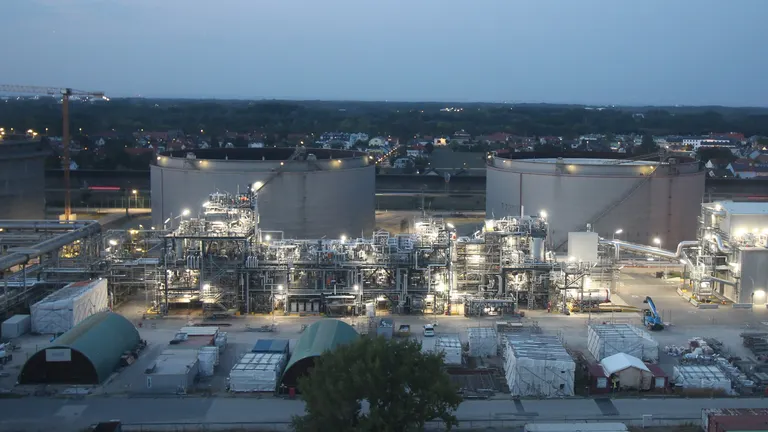Our new ReOil® plant has a planned recycling capacity of 16,000 tons of end-of-life plastic per year. Discover how we are scaling up this groundbreaking technology and meet one of the innovators who made it possible.
From sustainable transport to plastic recycling, new technologies are helping tackle some of today’s greatest challenges. But discovering them and proving that they work are just the first couple of steps in a long journey.
To turn the potential of these new technologies into meaningful impact, they need to be scaled up for deployment on an industrial scale. And that process can make or break an innovation.
At OMV, we’re proud to have some incredible people in our ranks taking charge of the process. Through their dedication and ingenuity, we have taken our ReOil® technology from the lab to a fully operational chemical recycling plant that we designed and built from scratch. This scale-up represents a significant milestone in our research and development efforts, not just at OMV but in the wider industry.
What is ReOil®?
ReOil is OMV's proprietary chemical recycling technology. It turns end-of-life plastic into circular feedstock for the production of chemicals, which can then replace fossil resources in new plastics.
A complement to traditional mechanical recycling methods, the process enables us to recycle plastic from a wide range of sources, including household products we use everyday. Now our ReOil plant is up and running, we can recycle up to 16,000 metric tons of end-of-life plastic every year - a massive leap forward in our chemical recycling operations.
But how did we get to this point?
Where is it on the scale-up journey?
Once we’d proved its viability at the lab scale, we built a pilot plant directly in our Schwechat refinery. There, we carried out test runs on a wide range of post-consumer plastics (PCPs).
“It was so important to establish a good and stable process in our ReOil pilot plant,” explains Senior Process Engineer Rene Bonholzer, “and this is then the basis for scaling up. Running the ReOil pilot plant taught us a lot of important things about the operation: what worked well, where it went wrong and how we can optimize the process.”
These included technical learnings like finding the optimal reactor temperature, the adjustments needed when processing different types of PCP, the interaction between the various sections of the unit and even identifying new sections required for the much larger ReOil plant.
But it also showed us how important it is to establish efficient workflows, both within and between the different teams involved. “We worked closely alongside the inspection and maintenance departments to identify and carry out repairs, as well as the electric and automation teams responsible for measurement equipment. It’s been a whole team effort”, Rene points out.
What did the start-up entail?
Scaling up a new technology brings unique challenges. At each stage of the development process, the team must overcome them, gathering as much information along the way to feed into the next stage.
Volume is the most immediate hurdle. The ReOil pilot plant received one truckload of plastic every two weeks; our new ReOil plant will receive up to eight every day. Overcoming it meant working with the logistics department to accommodate the influx of vehicles unloading as well as using our storage capacity as efficiently as possible.
Mass balancing, the method we use to track the plastic we recycle and work out how much makes its way into the final products, is critical for a circular technology like ReOil. Scaling up their calculations for the much larger volumes of plastic handled in the ReOil plant caused Rene and the operations team some headaches – but this essential work enables us to assess the project’s true impact.
Why is the new ReOil® plant a significant step?
Rene explains: “With ReOil, we’re fighting against two main problems: plastic waste and climate change. By substituting the base chemicals we produce for the crude oil normally used to produce plastics, we can reduce our reliance on fossil resources. It also gives PCPs a second life, diverting them away from waste streams where they are either burned or go to landfill.”
And this isn’t just theoretical. With the new ReOil plant, we’re showing that the technology can be deployed in the real world. It also demonstrates that ReOil is uniquely scalable, that we’re pioneering a new way of recycling plastic with genuine, realizable potential to divert waste from landfill and incineration. For an engineer like Rene, this is a constant source of motivation: “I always wanted to be a process engineer so it’s exciting to be here putting what I learned at university into practice at the refinery. It’s even more exciting to work on a circular project like ReOil, and with a great team around me.”
The team is already looking ahead to the next stage of the development process, which will see the technology deployed at a larger industrial scale.
Rene Bonholzer, Senior Process Engineer
The start-up of ReOil is an important milestone, not just for OMV but for the wider push towards a more circular economy. It’s the tireless work of our innovators that transform this innovative technology from an idea into meaningful impact.
Starting up the ReOil plant has been a truly cross-divisional innovation, with many contributors from various departments. Without the dedication of these colleagues, this achievement would not have been possible.
